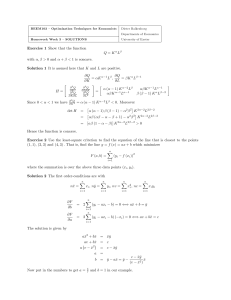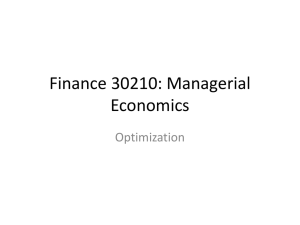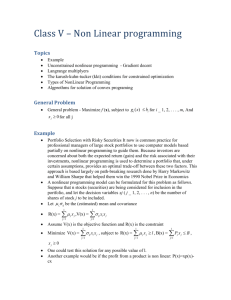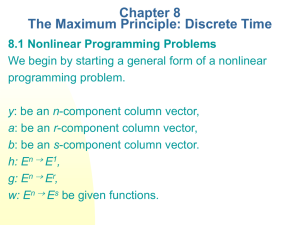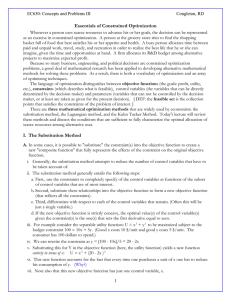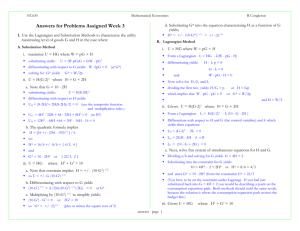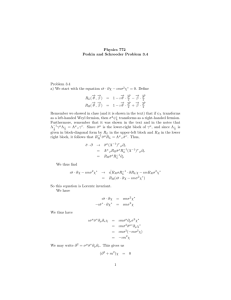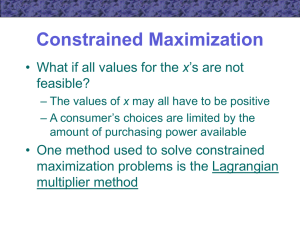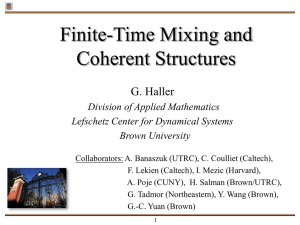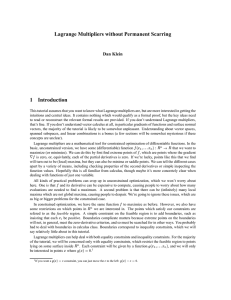A Transportation Programming Model Considering Project
advertisement
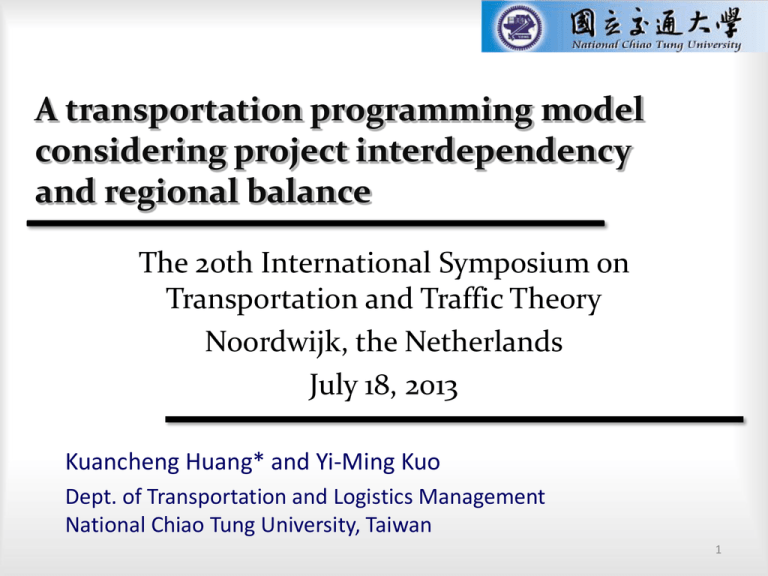
A transportation programming model
considering project interdependency
and regional balance
The 20th International Symposium on
Transportation and Traffic Theory
Noordwijk, the Netherlands
July 18, 2013
Kuancheng Huang* and Yi-Ming Kuo
Dept. of Transportation and Logistics Management
National Chiao Tung University, Taiwan
1
Outlines
•
•
•
•
•
Introduction
Problem Background and Literature Review
Mathematical Model
Solution Algorithm
Conclusions
2
Introduction
Transportation Programming (TP)
Given a fixed budget,
how to select the projects
to be implemented?
25 transportation projects in Taiwan with a cost
larger than 1 billion NTD in 2010
3
Introduction
Knapsack Problem (KP) Approach
G (budget)
Issue I: Project
Inter-dependency
-bj (benefit of project j)
Issue II: Regional Balance
mj (cost of project j)
4
Literature Review & Background
Example of Political Influence
• The districts receiving the most funds are …
(Spanish data for the period 1964–2004)
– The incumbent’s vote margin is low.
– Few votes are needed to win an additional seat.
– The central and regional governments are
controlled by the same party.
– Regional parties play a pivotal role in the
legislature.
Solé-Ollé, A. (2013), Inter-regional redistribution through infrastructure
investment: tactical or programmatic, Public Choice, 156:229–252.
5
Literature Review & Background
TP Works w/ Dependent Projects
Independent
Complementary
Substitutive
Teng & Tzeng (1996), A multiobjective programming approach for selecting
6
non-independent transportation investment alternatives, TR-B, 30: 291-307.
Literature Review & Background
Iniestra and Gutiérrez (2009)
• Follow the multi-objective context and
project-interdependent features
– The average benefit/cost ratio of project portfolio
– The relevance to network connectivity
– State authorities’ preferences (an assigned
importance rank)
– The total level of congestion in the region
– The social impact (# of people who benefit)
• Solve the problem by Genetic Algorithm
Li et al. (2012), New Methodology for Transportation Investment Decisions
7
with Consideration of Project Interdependencies, TRR, 2285:36-46.
Literature Review & Background
Modeling Inter-dependency
• Basic project
• Joint project: the overall benefit (or cost) is
different from the sum of the individual
benefits (or costs) of the basic projects.
x1
x2
x3
x1 x2 1
x1 x3 1
x2 x3 1
8
Literature Review & Background
Other Exclusive Relations
• “Intrinsic” exclusive relations (beyond the
issue of joint projects)
– For one single initiative, the various versions (e.g.,
a one-lane or two-lane expansion of a highway
section).
– For multiple initiatives, the corresponding options
(e.g., a public bus terminal vs. a commuter parking
facility) cannot be selected simultaneously (e.g.,
utilizing the same piece of land).
9
Mathematical Model
Integer Programming Model
Minimize
s.t.
π
b x
jJ
m x
jJ
to be relaxed
f
jJ
λi
j
j
j
j
Minimize negative benefit (Maximize benefit)
G
Budget constraint
Exclusive Relations, e.g.,
rj
x j 1, r R
x j {0, 1}, j J
x1 x2 1
x1 x3 1
x2 x3 1
Regional balance: project j
a
x
1
,
i
I
ij j
jJ
contributes aij to region i.
A modification to SCP (Set Covering Problem)
10
Significance (Relevance) Level
A 51.03-km MRT line (140 billion
NTD) connecting Taipei city center
and the major int’l airport
Industry
Airport
(Aerotropolis)
1.00
Heavily Populated
Suburban
0.75
Capital City
Economic Center
0.25
11
Mathematical Model
Lagrangian Relaxed Model
c j (, ) b j i aij m j
iI
L(, ) Min c j (, ) x j ( i G)
jJ
f
jJ
rj
x j 1, r R
x j {0, 1}, j J
0 x j 1, j J
Linearly relax the LR problem.
iI
Exclusive Relations, e.g.,
x1 x2 1
x1 x3 1
x2 x3 1
Constraints similar to those of
the classic assignment problem
(AP), which holds the Total Unimodularity property.
12
1.
2.
Set the iteration counter n = 0
Determine the initial values of the
Lagrangian multipliers (Sub-section 3.4)
1.
2.
3.
Increment the counter from n to n +1
Compute Lagrangian cost cj(λ, π) (12)
Solve linearized Lagrangian-relaxed
problem (Sub-section 3.3)
Compute gradients (15) and (17)
4.
Solution Algorithm
No
Solution feasible?
Follow the 3-step procedure
for the feasible solution
(Sub-section 3.4)
Yes
1.
2.
Compute the upper bound
Update Lagrangian multipliers (14)
and (16)
n = N or gap < ?
No
Yes
Derive
solution
Flowchart of Algorithm
13
Mathematical Model
Feasible Solution
c j (, ) b j i aij m j
iI
• STEP 1: If the significance constraint (5) is violated, add the
unselected option based on the Lagrangian cost cj(, π) in
“ascending” order until Constraint (5) is satisfied.
• STEP 2: If the budget constraint (6) is violated, remove the
selected options (a) based on the Lagrangian cost cj(, π) in
“descending” order and (b) under the condition of satisfying
Constraint (5), until the overall budget is under the limit.
• STEP 3: If there is a slack for Constraint (6), further add the
option with the most negative Lagrangian cost cj(, π) until
the budget is fully utilized.
• Note: For STEP 1 and STEP 3, an option is added only if the
mutually exclusive constraint (7) is not violated.
14
Mathematical Model
Lagrangian Multiplier Update
Sub-gradient Method (Held & Karp, 1970)
si (t ) 1
t
t
), i I
,
(
x
j
j J i
, i I
s( t ) B c j x j (t , t ) j J i
t
t
t
)
,
(
L
UB
t
0
),
(
s
ti 1 max ti
, i I
i
t 2
s ( )
t
t
t
)
,
(
L
UB
t
0
),
(
s
t 1 max t
t 2
s( )
15
Numerical Experiment
Illustrative Example
International Airport RWY #1 Improvement
International Airport MRT System
Local Railway MRT
Transformation (Section I)
National Freeway #4
Extension
National Freeway
#6 Extension
National Freeway #6
Extension
West Coast Highway
Improvement
Chiayi City Local Railway
Overheadization
Highway #.9
Mountain Section
Improvement
Highway #11 Pacific
Coast Highway
Improvement
Highway #9 Phase III
Improvement
Local Railway MRT
Transformation (Section IV)
考慮涵蓋限制
16
Benefit
maximization only預算值=2000 Imposing
coverage constraint
未考慮涵蓋限制
Numerical Experiment
Results of the Illustrative Example
Price for compromising!
17
Numerical Experiment
Hypothetical Test Problems
Significance
Level Setting
Project Interdependence
18
Numerical Experiment
Results of Hypothetical Problems
Number of
basic projects
50
100
150
200
Number of
regions
Budget
Average number
of options
Average number
of constraints
25
49
81
121
10000
20000
30000
40000
265
570
821
1012
455
993
1424
1745
Number of
IP time (s) LR time (s)
basic projects
50
100
150
200
0.9
11.5
66.5
225.0
3.4
5.9
12.4
14.7
Solution quality
Mean
Std. Dev.
0.53%
0.63%
0.20%
0.15%
0.32%
0.17%
0.63%
0.60%
Bound quality
Mean
Std. Dev.
1.76%
1.27%
1.07%
0.65%
1.67%
0.54%
1.90%
0.80%
30 test problems of each problem scale
19
Conclusions
Conclusions
• An IP model addressing two practical TP features:
project interdependency and regional balance.
– Two Things You Shouldn't Watch Being Made: Sausage and
Legislation (Mark Twain)
• A Lagrangian-relaxed solution algorithm to derive a
promising approximate solution and a tight bound .
• Future Research Extensions
– A multi-stage model to address the issue of consistency
– A stochastic model for the issue of uncertainty
– A multi-objective model, given the diversified stakeholders
20
